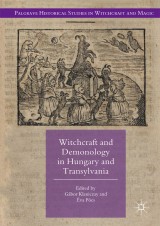Details

Witchcraft and Demonology in Hungary and Transylvania
Palgrave Historical Studies in Witchcraft and Magic
|
139,09 € |
|
| Verlag: | Palgrave Macmillan |
| Format: | |
| Veröffentl.: | 29.11.2017 |
| ISBN/EAN: | 9783319547565 |
| Sprache: | englisch |
Dieses eBook enthält ein Wasserzeichen.
Beschreibungen
This book provides a selection of studies on witchcraft and demonology by those involved in an interdisciplinary research group begun in Hungary thirty years ago. They examine urban and rural witchcraft conflicts from early modern times to the present, from a region hitherto rarely taken into consideration in witchcraft research. Special attention is given to healers, midwives, and cunning folk, including archaic sorcerer figures such as the táltos; whose ambivalent role is analysed in social, legal, medical and religious contexts. This volume examines how waves of persecution emerged and declined, and how witchcraft was decriminalised. Fascinating case-studies on vindictive witch-hunters, quarrelling neighbours, rivalling midwives, cunning shepherds, weather magician impostors, and exorcist Franciscan friars provide a colourful picture of Hungarian and Transylvanian folk beliefs and mythologies, as well as insights into historical and contemporary issues.
<div>The social background of witchcraft accusations in early modern Debrecen and Bihar County; Ildikó Sz. Kristóf.- Witchcraft, greed and revenge: The prosecutor activity of György Igyártó and the witch trials of Kolozsvár in the 1580s; László Pakó.- Healers in Hungarian witch trials; Gábor Klaniczay.- Divinatio diabolica and magical medicine. Healers, seers and diviners in early modern Nagybánya; Judit Kis-Halas.- Shamanism or witchcraft? The táltos before the tribunals; Éva Pócs.- The decriminalization of magic and the fight against superstitions in Hungary and Transylvania 1740-1848; Péter Tóth G.- Demonology and Catholic Enlightenment in eighteenth-century Hungary; Dániel Bárth.- Talking through witchcraft – on the bewitchment discourse of a village community; Ágnes Hesz.- Index.</div>
Gábor Klaniczay is Professor of Medieval Studies at the Central European University, Budapest, Hungary. His research interests are in the history of medieval and early modern sainthood and witchcraft. His previous books include <i>The Uses of Supernatural Power</i> (1990) and <i>Holy Rulers and Blessed Princesses</i> (2002). He coedited with Éva Pócs a three volume series, ‘Demons, Spirits and Witches’ (2005, 2006, 2008).<div><br></div><div>Éva Pócs is Professor Emeritus at the University of Pécs, Hungary. Her main areas of research are folk religion and folk beliefs, and witchcraft and demonology. Her previous publications include <i>Fairies and Witches at the Boundary of South-Eastern and Central Europe</i> (1989) and <i>Between the Living and the Dead: A Perspective on Witches and Seers in the Early Modern Age</i> (1998).</div>
This book provides a selection of studies on witchcraft and demonology by those involved in an interdisciplinary research group begun in Hungary thirty years ago. They examine urban and rural witchcraft conflicts from early modern times to the present, from a region hitherto rarely taken into consideration in witchcraft research. Special attention is given to healers, midwives, and cunning folk, including archaic sorcerer figures such as the táltos; whose ambivalent role is analysed in social, legal, medical and religious contexts. This volume examines how waves of persecution emerged and declined, and how witchcraft was decriminalised. Fascinating case-studies on vindictive witch-hunters, quarrelling neighbours, rivalling midwives, cunning shepherds, weather magician impostors, and exorcist Franciscan friars provide a colourful picture of Hungarian and Transylvanian folk beliefs and mythologies, as well as insights into historical and contemporary issues.
Shortlisted for the Folklore Society's 2018 Katharine Briggs Folklore Award Examines urban and rural witchcraft conflicts from early modern times to the present Analyses the role of healers, midwives, and cunning folk in social, legal, medical and religious contexts Traces the decriminalisation of witchcraft and decline of persecution in Hungary and Transylvania Includes supplementary material: sn.pub/extras
Diese Produkte könnten Sie auch interessieren:

The Last Samurai - Japanische Geschichtsdarstellung im populären Kinofilm

von: Daniel Scherrer

34,99 €















